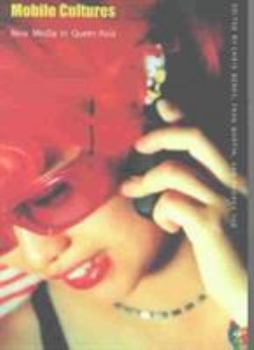Mobile Cultures: New Media in Queer Asia
(Part of the Console-ing Passions: Television and Cultural Power Series)
Select Format
Select Condition 
Book Overview
Mobile Cultures provides much-needed, empirically grounded studies of the connections between new media technologies, the globalization of sexual cultures, and the rise of queer Asia. The availability and use of new media-fax machines, mobile phones, the Internet, electronic message boards, pagers, and global television-have grown exponentially in Asia over the past decade. This explosion of information technology has sparked a revolution,...
Format:Paperback
Language:English
ISBN:0822330873
ISBN13:9780822330875
Release Date:April 2003
Publisher:Duke University Press
Length:312 Pages
Weight:1.05 lbs.
Dimensions:0.8" x 6.2" x 8.9"
Customer Reviews
1 rating
Extremely Comprehensive
Published by Thriftbooks.com User , 20 years ago
The most enlightening thing that this book has done for me was to get me to recognise how the term "Queer" can be just as hegemonic and oppressive as compulsory heterosexuality. The essays written about queer sexualities in Asia reveal an even more complex understanding of the workings of human sexuality than Western Queer discourse would be inclined to argue for. As we enter an age of a new colonialism with the spread of Western culturally subversive attitudes and ideologies through various forms of mass media such as the internet, magazines and television, sexuality in Asia is changing its shape in response. I loved Tom Boellstroff's essay "I Knew It Was Me: Mass Media, "Globalization," and Lesbian and Gay Indonesians," on the 'gay' and 'lesbi' communities in Asia that came to occupy their subject-positions through an appropriation of the English terms 'Gay' and 'Lesbian' within the Indonesian cultural context, with a different set of definitions. The essays on Japan were extremely thought provoking for me, as they bring up discussions on Japanese women's "Yaoi" (homoerotic boy-love stories and depictions), "Nyuhafu" (the Japanese transgendered, who occupy unique socio-economic positions in Japanese culture), the aesthetics of Japanese fiction when viewed and commodified by the Western gaze, "Kawaii" (or 'cute') as a possible form of subversive female identity by the masochistic embrace of child-like femininity to the extreme, and the adoption of a Japanese aesthetic in order to make an extreme genderqueer porn by Taiwanese-American filmmaker Shu Lea Cheang. I enjoyed the essays on Singapore and Malaysia as well, having come from the region myself, as they discuss a unique embrace of a new hegemonic "Asian values" as a defensive response to the growing cosmopolitanism of the country which those in power feel brings in countercultural Western sexual values. My only disappointment was the essay "Syncretism and Synchronicity: Queer'n'Asian Cyberspace in 1990s Taiwan and Korea" by Chris Berry and Fran Martin, because of the fact that it was primarily a list of statistics to showcase broad points, when in fact the actual number of people covered in these statistics was too small to make any generalised comment on the queerscape of these two very different countries. It became less of a comparison of these two nations more than it became a tedious and unsuccessful attempt at compare and contrast. All in all, however, it is an incredible read, and a very well-researched book that I had difficulty putting down once I picked it up.






